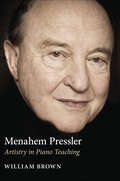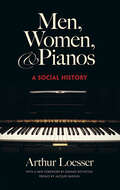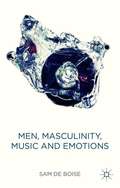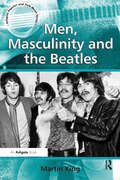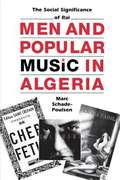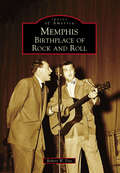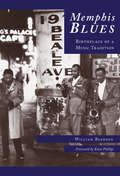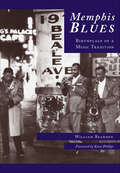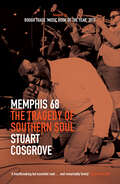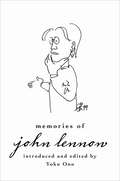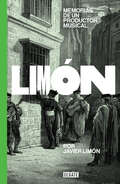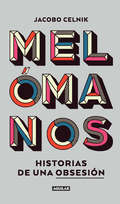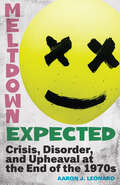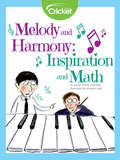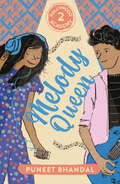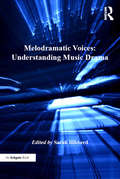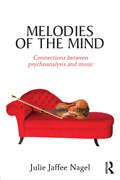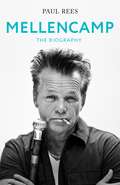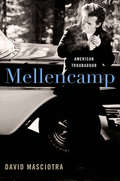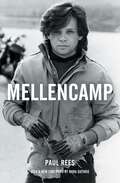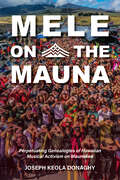- Table View
- List View
Menahem Pressler: Artistry in Piano Teaching
by William BrownAs soloist, master class teacher, and pianist of the world-renowned Beaux Arts Trio, Menahem Pressler can boast of four Grammy nominations, three honorary doctorates, more than 80 recordings, and lifetime achievement awards presented by France, Germany, and Israel. Former Pressler student William Brown traces the master's pianistic development through Rudiakov, Kestenberg, Vengerova, Casadesus, Petri, and Steuermann, blending techniques and traditions derived from Beethoven, Chopin, Liszt, and J. S. Bach. Brown presents Pressler's approach to performance and teaching, including technical exercises, principles of relaxation and total body involvement, and images to guide the pianist's creativity toward expressive interpretation. Insights from the author's own lessons, interviews with Pressler, and recollections of more than 100 Pressler students from the past 50 years are gathered in this text. Measure-by-measure lessons on 23 piano masterworks by, among others, Bach, Bartók, Debussy, and Ravel as well as transcriptions of Pressler's fingerings, hand redistributions, practicing guidelines, musical scores, and master class performances are included.
Men, Women and Pianos: A Social History
by Arthur LoesserA piano's-eye view of the social and philosophical history of Western Europe and the United States from the 17th century to the 1950s, with glances forward and back.
Men, Women and Pianos: A Social History
by Arthur LoesserAs the "social anchor" in middle-class homes of the nineteenth century, the piano was simultaneously an elegant piece of drawing-room furniture, a sign of bourgeois prosperity, and a means of introducing the young to music. In this admirably balanced and leisurely account of the popular instrument, the late, internationally known concert pianist Arthur Loesser takes a "piano's-eye view" of the recent social history of Western Europe and the United States.Drawing on newspapers, music manuscripts, popular accounts, and other sources, Loesser traces the history of the piano from its predecessors, the clavichord and the harpsichord, to the modern spinet and concert grand. Chapter headings such as "Clavichords Make Weeping Easier," "The Harpsichord Grows Feet," "The More Pianos the Merrier," and "The Keyboards Go West" suggest the author's lighthearted approach to topics ranging from the piano's European origins and its introduction in the United States to the decline of piano manufacturing in the early twentieth century and the "victory of airborne music" by mid-century. A preface by historian Jacques Barzun and a new foreword by music critic Edward Rothstein enhance a volume rich in wit and knowledge -- one that will delight any reader with an interest in the piano and on Western cultural history.
Men, Women & Pianos
by Arthur LoesserSome of the greatest composers of history have confined some of their most precious thoughts to the piano. For a century and a half, series of pianists of outstanding nimbleness and expressive power have attracted millions of admirers to their performances. Mozart, Beethoven and Chopin, Liszt, Rubinstein and Rachmaninov, to achieve the fulfillment of their art, needed to have pianos. From where did they get them? From factories, of course. But piano factories cannot stay in business simply by making a few instruments for a few great musicians. They must sell their products annually by the hundreds, by the thousands, to all manner of persons: doctors, lawyers, merchants, government officials. What did those persons want with pianos? This book may supply some answers to this question." That is the modest raison d'être for his book given by the author in a letter to the publisher. But any reader will see at once that the proliferations in the answer to his question result in something much more important and delightful. What Mr. Loesser has written is really a piano's-eye view of the social--and sometimes the philosophical--history of Western Europe and the United States from the seventeenth century to the present, with glances both forward and back. With a keen eye for both the ridiculous and the significant detail (which turn out often to be the same thing), he traces the history of the design and manufacture of the piano, and the music written for it, from its predecessors, the clavichord and the virginal, to the latest concert grand and the modern "spinet." Long established as an internationally known concert pianist, Mr. Loesser here shows himself to be an elegant stylist and an impressively learned scholar, who has the wit to see that in a social history the role of the interior decorator may be quite as important as that of the virtuoso--and that of the ambitious parent, more important than either.
Men, Masculinity, Music and Emotions
by Sam BoiseThis book looks at the historic and contemporary links between music's connection to emotions and men's supposed discomfort with their own emotional experience. Looking at music tastes and distaste, it demonstrates how a sociological analysis of music and gender can actually lead us to think about emotions and gender inequalities in different ways.
Men, Masculinity and the Beatles (Ashgate Popular and Folk Music Series)
by Martin KingDrawing on methodologies and approaches from media and cultural studies, sociology, social history and the study of popular music, this book outlines the development of the study of men and masculinities, and explores the role of cultural texts in bringing about social change. It is against this backdrop that The Beatles, as a cultural phenomenon, are set, and their four live action films, spanning the years 1964-1970, are examined as texts through which to read changing representations of men and masculinity in 'the Sixties'. Dr Martin King considers ideas about a male revolt predating second-wave feminism, The Beatles as inheritors of the possibilities of the 1950s and The Beatles' emergence as men of ideas: a global cultural phenomenon that transgressed boundaries and changed expectations about the role of popular artists in society. King further explores the chosen Beatle texts to examine discourses of masculinity at work within them. What emerges is the discovery of discourses around resistance, non-conformity, feminized appearance, pre-metrosexuality, the male star as object of desire, and the emergence of The Beatles themselves as a text that reflected the radical diversity of a period of rapid social change. King draws valuable conclusions about the legacy of these discourses and their impact in subsequent decades.
Men of Music: Their Lives, Times and Achievements
by Wallace Brockway Herbert WeinstockBiographies of Bach, Handel, von Gluck, Haydn, Mozart, Beethoven, von Weber, Rossini, Schubert, Mendelssohn, Schumann, Chopin, Berlioz, Liszt, Wagner, Verdi, Brahms, Tchaikovsky, Debussy, Strauss, Sibelius, and Stravinsky.
Men and Popular Music in Algeria
by Marc Schade-PoulsenRaï music is often called the voice of the voiceless in Algeria, a society currently swept by tragic conflict. Raï is the voice of Algerian men, young men caught between generations and classes, in political strife, and in economic inequality. In a ground-breaking study, anthropologist Marc Schade-Poulsen uses this popular music genre as a lens through which he views Algerian society, particularly male society. He situates raï within Algerian family life, moral codes, and broader power relations. Schade-Poulsen did his research in the 1990s, in clubs, recording studios, at weddings, and with street musicians. He describes the history of raï, which emerged in the late 1970s and spread throughout North Africa at the same time the Islamist movement was growing to become the most potent socio-political movement in Algeria. Outsiders consider raï to be Western in origin, but Schade-Poulsen shows its Islamic roots as well. The musicians do use Western instruments, but the music itself mixes Algerian popular songs and rhythms with the beat of American disco, Egyptian modalities, Moroccan wedding tunes, and the songs of Julio Iglesias. The lyrics deal with male-female relationships but also with generational relationships and the problems of youth, as they struggle to find a place in a conflicted society. The study, in its innovative approach to music as a template of society, helps the reader understand the two major movements among today's Algerian youth: one toward the mosque and the other toward the West.
Memphis: Birthplace of Rock and Roll (Images of America)
by Robert W. DyeThe music that has been produced in Memphis over the past 100 years is as unique and diverse as the city itself. Growing out of the Mississippi Delta, the Memphis blues have been transported worldwide by such ambassadors as B.B. King and Howlin' Wolf. Rock's first baby steps were taken at the tiny Sun Studio by a group of artists who have inspired generations of musicians to follow in their beat. Soul music found its groove at Stax with a homegrown sound that exploded onto the American music scene. Music producers, including Sam Phillips, Willie Mitchell, Chips Moman, and Jim Stewart, found in Memphis a sound as distinctive as their individual personalities. Each one inspired, motivated, and encouraged their artists and, in doing so, produced a volume of work that has become the sound track of their generation.
Memphis Blues: Birthplace of a Music Tradition
by William BeardenMemphis means music. That relationship was solidified in 1909 when W. C. Handy wrote the song “Mr. Crump” and later published it as the “Memphis Blues.” As Handy’s songs were sung and played in streets and music halls, a spotlight began to shine on a new mecca for innovation in music—Memphis, Tennessee. Memphis Music: Before the Blues surveys the people, music, and events that contributed to the rich musical life that emerged against the backdrop of the Civil War and yellow fever in the 19th century. The story is not just one of the building blocks to what has been called America’s greatest export—popular music—but rather it is a story of ongoing innovation and creativity that came from a convergence of people of different cultures.
Memphis Blues: Birthplace of a Music Tradition
by William BeardenThe blues was born in the Mississippi Delta, and since that fateful night in 1903 when W. C. Handy heard the mournful sound of a pocketknife sliding over the strings of an acoustic guitar and the plaintive song of a long-forgotten musician in the hot night of Tutwiler, Mississippi, the blues has been on a journey around the world. From the cotton fields and jukejoints of the Delta, up Highway 61 to Memphis�s Beale Street, St. Louis, the Southside of Chicago, England, and points beyond, the blues is America�s unique form of music. Blues is incisive in its honesty, elemental in its rhythm,and powerful in its almost visceral sensation. Nearly every style of popular music has its roots in the blues. Muddy Waters said it best: �The blues had a baby, and they called it rock and roll.� Memphis has become the heart of the blues world, with a re-born Beale Street acting as its spiritual center. People come from the world over to experience its beat, savor its emotion, and feel its power. In the end . . . �it ain�t nothin� but the blues.�
Memphis 68: The Tragedy of Southern Soul (The Soul Trilogy #2)
by Stuart CosgroveSecond in the award-winning soul music trilogy following Detroit 67—featuring Memphis artists Isaac Hayes, Mahalia Jackson, Otis Redding, and others. In the 1950s and 1960s, Memphis, Tennessee, was the launchpad for musical pioneers such as Aretha Franklin, Elvis Presley, Johnny Cash, Al Green, and Isaac Hayes, and by 1968, it was a city synonymous with soul music. It was a deeply segregated city, ill at ease with the modern world and yet to adjust to the era of civil rights and racial integration. Stax Records offered an escape from the turmoil of the real world for many soul and blues musicians, with much of the music created there becoming the soundtrack to the civil rights movement. The book opens with the death of the city&’s most famous recording artist, Otis Redding, who died in a plane crash in the final days of 1967, and then follows the fortunes of Redding&’s label, Stax/Volt Records, as its fortunes fall and rise again. But as the tense year unfolds, the city dominates world headlines for the worst of reasons: the assassination of civil rights leader Martin Luther King Jr. Winner of the Penderyn Music Book Prize in 2018 &“As ever, Cosgrove&’s lucid, entertaining prose is laden with detail, but never at the expense of the wider narrative. Hinging on that Memphis destination, he traces the savage dichotomy at the city&’s heart: it was the site of multi-racial soul imprint Stax, but also the place where Martin Luther King was killed. A heartbreaking but essential read, and one that feels remarkably timely.&” —Clash Magazine
Memories: The Autobiography of Ralph Emery
by Tom Carter Ralph EmeryMemories is the autobiography of country music star Ralph Emery.
Memories of John Lennon
by Yoko Ono“A wonderful book for fans of Lennon. . . . Highly recommended.” —Library JournalJohn Lennon . . . as much a part of our world today as he ever wasHe touched many lives in his brief forty years, and continues to move and inspire millions more to this day. Now, invited by Yoko Ono, friends, family, and fans from all walks of life—including some of the great artists of our day—reminisce about Lennon as a visionary and friend, musician and performer, husband and father, activist and jokester.In their own words and drawings, poems and photos, Lennon's life from his childhood through the Beatles years to the happiness and tragedy of his final days become stunningly vivid.Intimate glimpses gathered from musicians who knew John, such as Pete Townshend, Sir Elton John, Billy Preston, and Joan Baez; friends and relatives such as producer David Geffen, publicist Elliot Mintz, and cousin Mike Cadwallader; and artists who followed him such as Bono, Alicia Keys, Steve Earle, Jello Biafra, and Carlos Santana.And, for the first time, renowned photographer Annie Liebovitz presents every frame of the historic last session with John and Yoko.Memories of John Lennon is a rich and deeply felt appreciation of a truly great man.“Heartfelt . . . poignant reminders of why Lennon was so widely mourned and is missed to this day.” —Booklist
Memorias de un productor musical
by Javier LimónUn maravilloso relato en primera persona de los últimos veinte añosen el mundo de la música en España. Javier Limón es probablemente el productor musical español más importante de los últimos veinte años. Ganador de ocho premios Grammy, ha producido casi cien discos de artistas como Diego el Cigala, Bebo Valdés, Paco de Lucía, Andrés Calamaro, Buika, Ana Belén, Antonio Orozco, Estopa, Joan Manuel Serrat y Joaquín Sabina, entre muchísimos otros. En estas fascinantes y divertidas memorias, repletas de anécdotas y de personajes conocidos, Limón nos cuenta como un chaval madrileño sin mucho talento musical se acabó convirtiendo en una leyenda de la música y en factor clave para el surgimiento de numerosos sonidos y movimientos en la escena musical española. Sobre el libro se ha dicho...«Disfrazado de profesional de la música, Javier Limón esconde en verdad a un profesional de la vida, alguien que ha hecho del disfrute un oficio».David Trueba «Javier Limón es un dínamo musical. En todo lo que hace se involucra con una energía y un entusiasmo que contagia. Tiene un amor por la música y por la vida, que unido a su experiencia y su talento sintético y minimalista, lo vuelven un compañero de trabajo creativo inigualable».Jorge Drexler «Me gustaría cantar para poder contar lo que Javier Limón aporta al arte y la cultura españoles; querría componer para poder compartir cómo Javier ha sabido hacerlo, con sus letras, sus notas, sus acordes, con su música; me encantaría saber recitar para trasladarle a todos los que se fijan, intuyen, escuchan, con la mente despejada, a corazón abierto, con los cinco sentidos, que sin Casalimón muchos artistas incipientes de enorme talento pero escasas oportunidades no habrían tenido ni tendrían un hogar... Javier, Eva... que ese aroma fresco que destiláis os acompañe, nos acompañe, siempre».Juan Cierco «Javi Limón no necesita el aplauso porque le sobra el talento. Es músico, productor y profesor. Atentos si abren estas páginas, este artista convierte la música en el mejor de los vicios».Mamen Mendizábal «Con Javier Limón aprendimos que en la radio, en la tele o allá dónde nos dejaran un hueco, todo por difícil que pueda parecer es posible, siempre y cuando encuentres a la persona capaz de transmitir su pasión, la música en el caso de Javier».Toni Garrido
Melómanos: Retratos de una obsesión
by Jacobo CelnikDieciocho retratos de hombres y mujeres que encontraron en la música la razón de vivir. ¿Sobrevivirán a esta adicción? Pocas cosas despiertan en los seres humanos tantas pasiones y sentimientos encontrados como la música, pero mientras para la mayoría es sencillamente un pasatiempo, para otros se vuelve la razón de su existencia. Y dedican años a buscar y atesorar objetos y recuerdos que giran alrededor de su obsesión más preciada. En este libro, Jacobo Celnik, melómano incurable, pasea por la vida de un adicto a los Rolling Stones que sufre de insomnio porque su colección está incompleta; una esposa herida que toma medidas desesperadas para deshacerse de los discos de su futuro exmarido; un heroinómano que se consume su colección de rock; un enfermo terminal dedicado a llenar su apartamento de discos antes de morir; y una adicta al sonido en vivo, que a punta de ingenio y valentía, logra presenciar algunos de los eventos más importantes del rock sin pagar un centavo… Así, guiado por estanterías, pulgueros y sótanos, explora los aspectos emocionales y psicológicos del amor por la música, y retrata con nombre propio las historias de quienes cambiarían su reino por un disco, para sacudir esa incurable e inagotable obsesión que casi siempre termina en delirio.
Meltdown Expected: Crisis, Disorder, and Upheaval at the end of the 1970s
by Aaron J. LeonardIn January 1978, President Jimmy Carter proclaimed that “There is all across our land a growing sense of peace and a sense of common purpose.” Yet in the ensuing months, a series of crises disturbed that fragile sense of peace, ultimately setting the stage for Reagan’s decisive victory in 1980 and ushering in the final phase of the Cold War. Meltdown Expected tells the story of the power shifts from late 1978 through 1979 whose repercussions are still being felt. Iran’s revolution led to a hostage crisis while neighbouring Afghanistan became the site of a proxy war between the USSR and the US, who supplied aid to Islamic mujahideen fighters that would later form the Taliban. Meanwhile, as tragedies like the Jonestown mass suicide and the assassination of Harvey Milk captured the nation’s attention, the government quietly reasserted and expanded the FBI’s intelligence powers. Drawing from recently declassified government documents and covering everything from Three Mile Island to the rise of punk rock, Aaron J. Leonard paints a vivid portrait of a tumultuous yet pivotal time in American history.
Melody and Harmony
by Diana Thistle Tremblay Annette CateDid you know that music is all about math? Every good composer knows their scales, along with the repetition, frequencies, and vibration that go into making harmonies and melodies that are pleasing to hear.
Melody Queen: Melody Queen (The Bollywood Academy #2)
by Puneet BhandalCan music-obsessed Simi stand up to a gender-biased industry? Twelve-year-old Simi's life is set. First: graduate from the Bollywood Academy, school to future stars. Second: become a super-famous actor, just like her showbiz parents. There's only one problem: Simi would rather make music than act, and music is a profession dominated by men. Can Simi navigate the gender barriers of the industry to prove she has what it takes to become Bollywood's next big music composer? A story of passion for music and courage in the face of overwhelming odds, this second book in the dazzling world of Bollywood is sure to get your toes tapping and head bopping to Simi's beat.
Melodramatic Voices: Understanding Music Drama (Ashgate Interdisciplinary Studies in Opera)
by Sarah HibberdThe genre of mélodrame à grand spectacle that emerged in the boulevard theatres of Paris in the 1790s - and which was quickly exported abroad - expressed the moral struggle between good and evil through a drama of heightened emotions. Physical gesture, mise en scène and music were as important in communicating meaning and passion as spoken dialogue. The premise of this volume is the idea that the melodramatic aesthetic is central to our understanding of nineteenth-century music drama, broadly defined as spoken plays with music, operas and other hybrid genres that combine music with text and/or image. This relationship is examined closely, and its evolution in the twentieth century in selected operas, musicals and films is understood as an extension of this nineteenth-century aesthetic. The book therefore develops our understanding of opera in the context of melodrama's broader influence on musical culture during the nineteenth and twentieth centuries. This book will appeal to those interested in film studies, drama, theatre and modern languages as well as music and opera.
Melodies of the Mind: Connections between psychoanalysis and music
by Julie Jaffee NagelWhat can psychoanalysis learn from music? What can music learn from psychoanalysis? Can the analysis of music itself provide a primary source of psychological data? Drawing on Freud's concept of the oral road to the unconscious, Melodies of the Mind invites the reader to take a journey on an aural and oral road that explores both music and emotion, and their links to the unconscious. In this book, Julie Jaffee Nagel discusses how musical and psychoanalytic concepts inform each other, showing the ways that music itself provides an exceptional non-verbal pathway to emotion – a source of 'quasi' psychoanalytical clinical data. The interdisciplinary synthesis of music and psychoanalytic knowledge provides a schema for understanding the complexity of an individual's inner world as that world interacts with social 'reality'. There are three main areas explored: The Aural Road Moods and Melodies The Aural/Oral Road Less Travelled Melodies of the Mind is an exploration of the power of music to move us when words fall short. It suggests the value of using music and ideas of the mind to better understand and address psychological, social, and educational issues that are relevant in everyday life. It will be of interest to psychoanalysts, psychologists, music therapists, musicians, music teachers, music students, social workers, educators, professionals in the humanities and social services as well as music lovers. Julie Jaffee Nagel is a graduate of The Juilliard School, The University of Michigan, and The Michigan Psychoanalytic Institute. She is on the faculty of the Michigan Psychoanalytic Institute and is in private practice in Ann Arbor, Michigan.
Mellencamp: The Biography
by Paul ReesThe definitive biography of John Mellencamp featuring exclusive interviews and never-before-told details about the life of the iconic American rock and roll original.John Mellencamp is not your typical rock star.With music inspired by the work of William Faulkner, John Steinbeck, and other giants of American literature, Mellencamp is a complex, colorful and larger than life character who walks to the beat of his own drum. Or, as he told author and veteran music journalist, Paul Rees: 'I just refuse to take shit off anyone'. Now, this fascinating biography fully charts the life of one of this country's most important voices in American music.Mellencamp's story is also the story of the American heartland. His coming of age as an artist and evolution into legendary status directly reflected the major changes of the last fifty years. From the Summer of Love to the growing divisiveness of American politics and beyond, his music has served as the backdrop of this evolving country for millions of fans.For the first time, this story written with the cooperation and support of Mellencamp and his management will include extensive interviews with members of Mellencamp's family, many of his bandmates and collaborators, past and present, and Mellencamp himself. Together, they shed new light on a man hailed by none other than Johnny Cash as 'among our greatest living songwriters'. An exploration of everything from the founding of Farm Aid to his induction into the Rock and Roll Hall of Fame, this is a fresh and expansive look at a true original.
Mellencamp: American Troubadour
by David MasciotraAn in-depth biography of &“a major artist whose work is sometimes obscured by the shadows of Bob Dylan and Bruce Springsteen&” (Craig Werner, author of Up Around the Bend: An Oral History of Creedence Clearwater Revival). Despite his numerous hits and Grammy nominations—and his induction into the Rock & Roll Hall of Fame—John Mellencamp remains one of America&’s most underrated songwriters. In Mellencamp, David Masciotra explores the life and career of this important talent, persuasively arguing that he deserves to be celebrated alongside artists like Bruce Springsteen, Neil Young, and Bob Dylan. Starting with his modest beginnings in Seymour, Indiana, Masciotra details Mellencamp&’s road to fame, examining his struggles with the music industry and his persistent dedication to his midwestern roots as he found success by remaining true to where he came from. From a cultural critic who has contributed to the Washington Post, Atlantic, and Los Angeles Review of Books and who &“writes with the precision and integrity and humanity of a great journalist&” (New York Times–bestselling author James Lee Burke), this thoughtful analysis highlights four decades of the artist&’s music, which has consistently elevated the dignity of everyday people and honored the quiet heroism of raising families and working hard.
Mellencamp
by Paul ReesThe definitive biography of John Mellencamp, the iconic American rock and roll original, featuring exclusive in-depth interviews and never-before-told details. Perfect for fans of Janis and Born to Run.John Mellencamp is not your typical rock star. With music inspired by the work of William Faulkner, John Steinbeck, and other giants of American literature, he has experienced a colorful career unlike any other. Now, this fascinating biography fully charts the life of one of this country&’s most important voices in American music. Mellencamp&’s story is also the story of the American heartland. His coming of age as an artist and evolution into legendary status directly reflected the major changes of the last fifty years. From the Summer of Love to the growing divisiveness of American politics and beyond, his music has served as the backdrop to this evolving country for millions of fans. Featuring exclusive interviews with friends, family, and colleagues, and exploring everything from the founding of Farm Aid to his induction into the Rock and Roll Hall of Fame, this is a fresh and expansive look at a true original.
Mele on the Mauna: Perpetuating Genealogies of Hawaiian Musical Activism on Maunakea (Activist Encounters in Folklore and Ethnomusicology)
by Joseph Keola DonaghyIn the summer of 2019, a group of kia'i, or protectors, made up of kānaka 'ōiwi (Native Hawaiians) and their allies came together to prevent the construction of the Thirty-Meter Telescope (TMT) on the dormant volcano Maunakea. In Mele on the Mauna, Joseph Keola Donaghy explores how music, and especially haku mele, or Hawaiian language composers, played a crucial role in this defense. Musicians flocked to the mauna (mountain) to perform for the kia'i and a worldwide audience via social media. Haku mele created new songs at unprecedented levels, releasing many commercially with proceeds benefiting organizations providing support services and supplies to the kia'i. This book features over 30 of the author's interviews with individuals who participated in musical activities connected with this movement, including kia'i and their supporters, composers, musicians, and community leaders. Donaghy explores Indigenous Hawaiian concepts and theories like mana (power), mo'okū'auhau and pilina (genealogy and relationships), kapu aloha (philosophical code of conduct), and aloha 'āina (love of land, patriotism), and western academic concepts like connectedness and community building, poetics, sound(ing) and silenc(e/ing), conflict, and creativity.Mele on the Mauna illuminates how music played a powerful role in building solidarity, inspiration, and activism, reveling in the most contentious confrontations about protecting Maunakea and the outpouring of musical performances and creativity that occurred.
